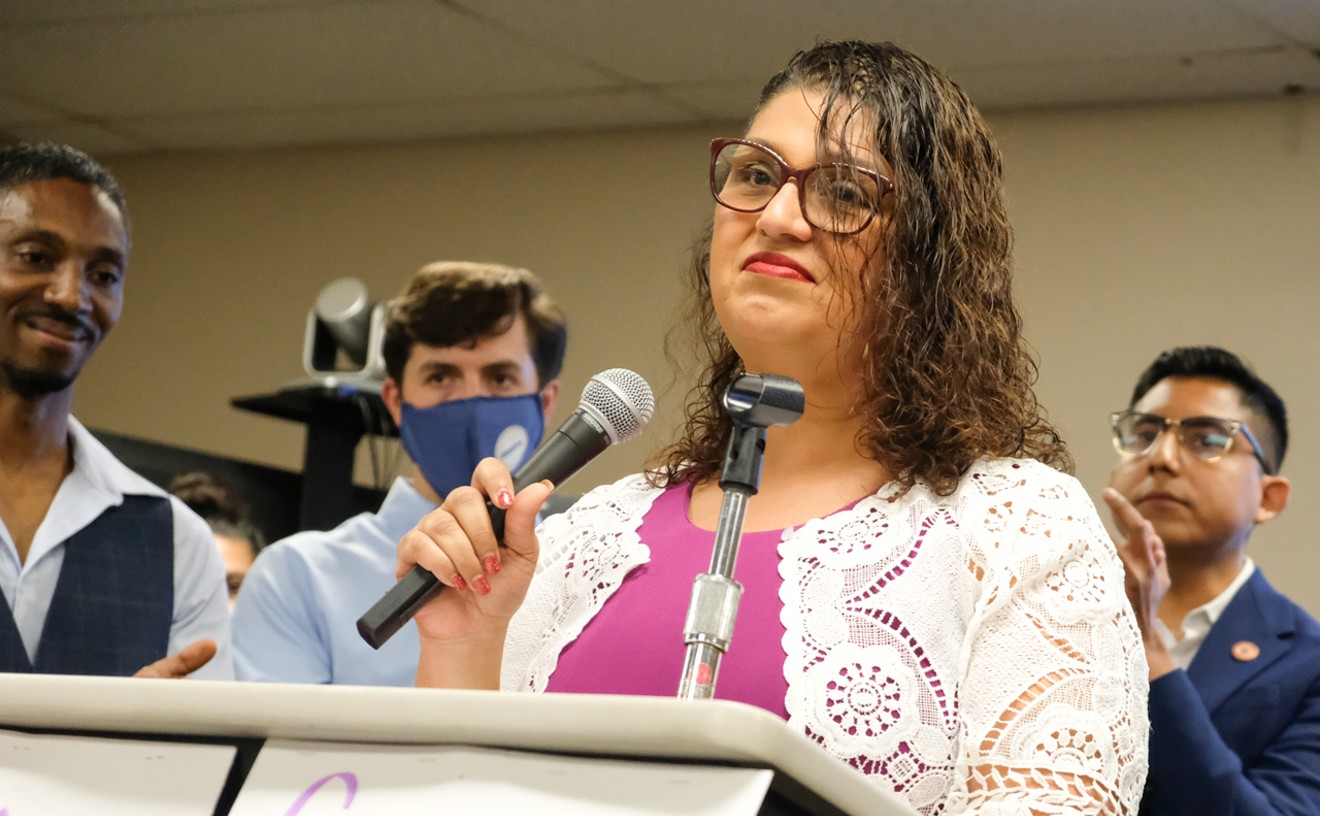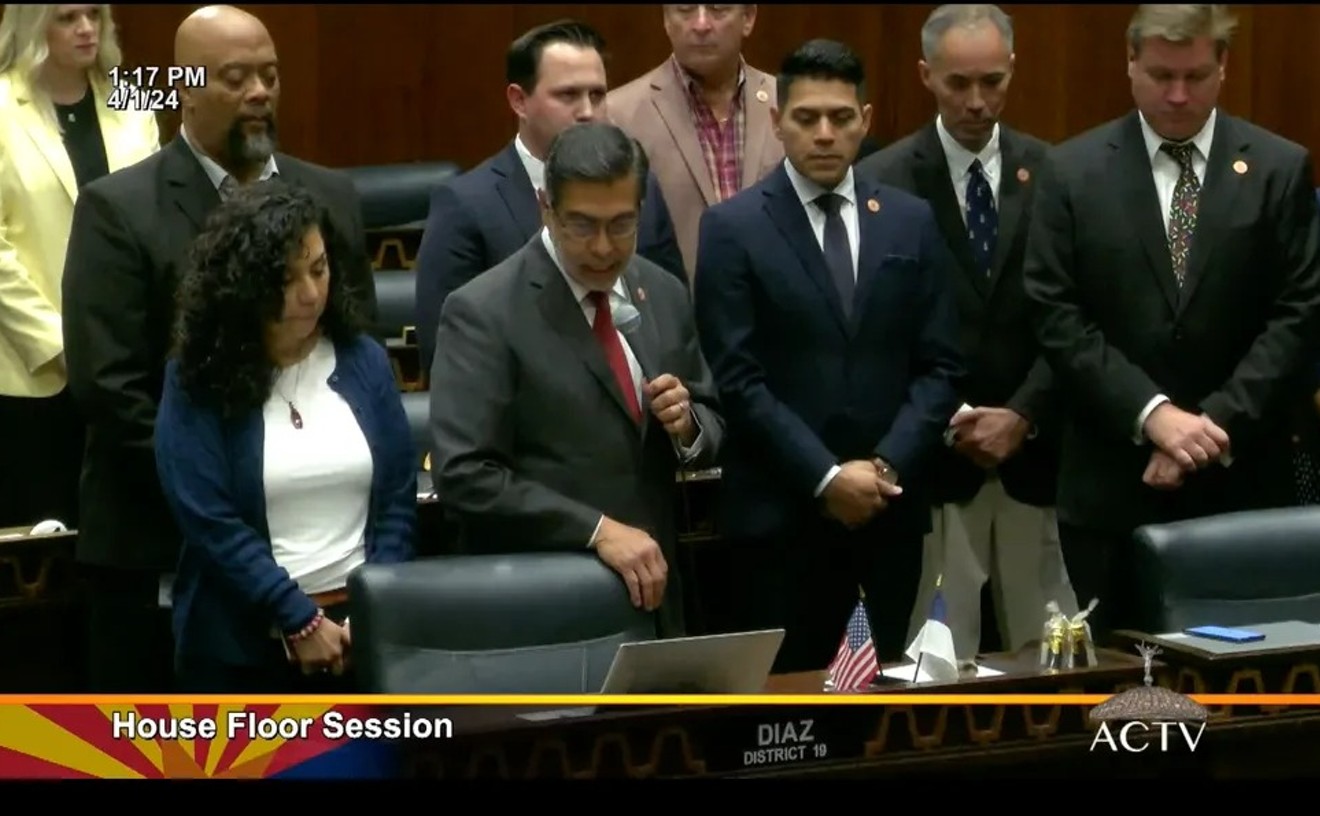For the second time in seven months, the Arizona Commission on Judicial Conduct recently informed the County Attorney's Office that Superior Court Judge Warren Granville's statements -- both in legal documents and in an interview with New Times -- did not merit censure or other punishment.
The brouhaha at the county courthouse ("Judicial Blacklash," December 1, 2005) first came to light last August 22 after Judge Granville sentenced black defendant Patrick Ivey to seven years in prison -- the legal minimum. At the same time, the judge invoked a law that enables certain convicts to petition the Board of Executive Clemency and then the governor for a reduction of sentence after going to prison.
The law, which is known as a 603-L provision, is a vehicle for trial judges to deal with mandatory prison terms they believe to be "clearly excessive."
Granville, a former prosecutor himself, concluded that a deputy county attorney had won a burglary conviction against Ivey "through the craven exercise of [her] authority by granting immunity, limiting [her] prosecutorial focus and denying immunity. . . . In this instance, the State chose not to prosecute the affluent individuals, and [instead] prosecuted or threatened to prosecute the black, indigent individuals."
Ivey also was acquitted of armed robbery and of kidnapping a young man during the August 2004 break-in of a guest house at the multimillion-dollar Paradise Valley home.
Case prosecutor Jennifer Linn took great offense at Granville's unusually pointed allegations, and objected to his findings in a 10-page response to the judge. She claimed that Ivey had been the sole person charged because Paradise Valley police simply couldn't make charges stick against Ivey's alleged co-conspirators, not because of racial bias.
Granville stood his ground.
Things died down publicly after the initial flurry of publicity in the case. But County Attorney Andrew Peyton Thomas and his minions remained hot about the judge's public affront.
In late August, a top assistant to Thomas filed a written complaint against the judge with the Arizona Commission on Judicial Conduct. It accused the judge of unethical conduct and called for sanctions because of Granville's statements concerning the Ivey case.
The panel cleared Granville in late November of judicial misconduct, while chiding him for having made "sweeping statements" about the County Attorney's Office without having enough evidence to support his accusations of racism.
The New Times story on the testy situation was published last December, and included an interview with Granville, who pointed out that "when you sign up as a judge, you have to act like a judge. I call it like I see it, and I plan to continue to do just that."
A week after the story hit the streets, the County Attorney's Office filed a second board complaint against Judge Granville. Like the first one, this one also was signed by Sally Wells, one of Thomas' top assistants.
It alleged that the "New Times article [published] disturbing quotes from Judge Granville that reinforced the Maricopa County Attorney's Office's earlier complaint about Judge Granville's lack of respect for the Judicial Code of Conduct."
Granville responded to the new complaint by calling it "the height of hypocrisy" by the prosecutor's office, a "political rant that this Commission should not countenance. . . . Such is not the fodder for the Commission's time and attention."
The judge suggested to the board that his interview with New Times had been a "lawful exercise of my First Amendment rights" he'd invoked because of the public and private allegations lodged against him.
As the Judicial Commission considered the County Attorney's latest complaint, prison authorities transported 21-year-old Ivey to Phoenix in mid-January for his 603-L hearing.
Ivey's mission was to convince three of the five Clemency Board commissioners that his seven-year sentence was excessive, and that the board should recommend to Governor Janet Napolitano a reduction of his prison term.
But even if Ivey was to win the day with the Clemency Board, Napolitano and her predecessors rarely have granted such commutations of sentence, even when the board has sent along a unanimous recommendation in favor of the inmate.
Clad in prison garb, handcuffed and shackled, the inmate alone faced the board inside the Alhambra prison on January 17. Not present were Ivey's court-appointed "advocates" from the county Public Defender's Office, who have been assigned to handle the convict's criminal appeal.
No one from that office responded to questions from New Times about why Ivey was forced to face the board without legal representation, a fact that outrages his trial lawyer, Dan DeRienzo.
"No one showed up?" says DeRienzo, who now practices in Prescott. "That's just wrong."
But prosecutor Jennifer Linn did show up for the hearing, ready to tell the board that Patrick Ivey should remain locked up for his full sentence and that she's not a racist.
Ivey asked board chairman Duane Belcher if prosecutors might use incriminating statements he might make about the Paradise Valley break-in against him. Belcher replied that he couldn't offer legal advice, and deferred to the only attorney in the room, Linn.
At first, Linn said that she, too, couldn't offer Ivey legal advice -- after all, she'd prosecuted the guy! -- but then added, "Maybe he'd be better off if he just says what he did."
Ivey did just that, confessing that he and another man first had convinced the victim to let them into his parents' gated compound while a third man waited in a car. He also admitted he'd threatened the victim with a handgun and had tied up the young man and duct-taped his mouth while the pair stole several items.
(Judge Granville had suppressed Ivey's earlier confession to a Paradise Valley detective after ruling that the officer badly had screwed up his Miranda Warning against self-incrimination.)
"He did not deserve to be robbed," Ivey said of his victim.
As for his own feelings about Jennifer Linn's alleged racial bias, Ivey told the board that "never once did I say she was racist. I don't know if she's racist."
After taking testimony, the board discussed the case among themselves for about a half-hour.
Board member Marshall H. Porter, a retired Honeywell manager, sided with Ivey, saying that "if this had happened on the [south] side of Central Avenue, it wouldn't have been an issue. This sounds to me like a drug deal gone bad."
Porter was referring to the fact that few people of color reside in Paradise Valley, in marked contrast to south Phoenix.
But board member Barbara-Lynne Bloss, a college English teacher, said she was "trying hard to figure out where the judge is coming from in all this. [Ivey] shouldn't get less time because other people didn't get punished."
In the end, the Clemency Board rejected Ivey's arguments by a vote of 3-2, which means that he'll stay behind bars for another five years or so.
On March 28, the Commission on Judicial Conduct summarily tossed out the County Attorney's second complaint against Judge Granville.
"As far as we are concerned, this case will remain closed," the board concluded.










